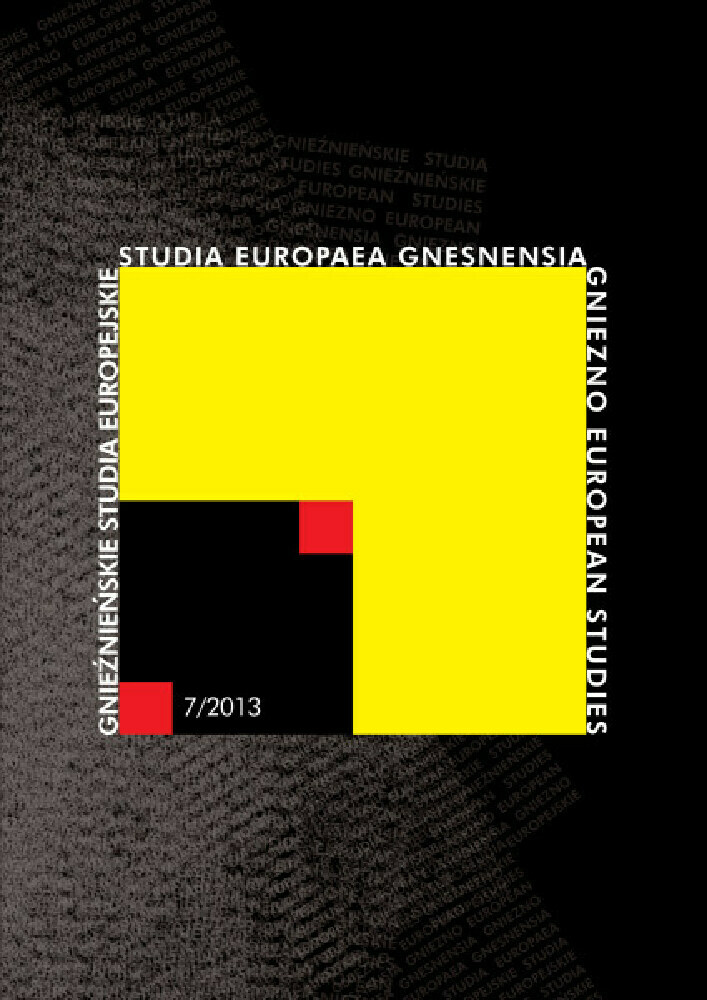Abstrakt
W artykule postawiono tezę, że wyrażenie ‘die friedliche Revolution’ jest konsekwencją przełomu wjęzyku, do którego doszło w Niemczech Wschodnich jesienią 1989 roku. Ten obecny we współczesnym oficjalnym piśmiennictwie w Niemczech zwrot pokazuje metodę konceptualizacji ówczesnych wydarzeń w NRD. Jego konotacje zestawić można z powstałymi wtedy formami wyrażania („językiem przełomu”), które miały budować w społeczeństwie wspólnotę wartości. Określenie ‘pokojowa rewolucja’ może być traktowane zatem jako kontynuacja „języka przełomu” wypełnionego retoryką rewolucyjnej walki o wolność. Stało się pojęciem, na podstawie którego tworzy się konkretny obraz wydarzeń roku 1989/1990 w Niemczech Wschodnich. W pracy podaje się także możliwe powody takiego wyboru językowego, między innymi w zestawieniu z terminem ‘przełom’ (‘die Wende’). Wnioski wynikające z artykułu pozwalają twierdzić, że wyrażenie ‘pokojowa rewolucja’, na mocy swoich pozytywnych konotacji, jest podstawą budowania wspólnej pamięci oficjalnej dotyczącej najnowszej historii Niemiec.
Bibliografia
Arendt H., Über die Revolution, Monachium 1965, p. 9.
Bralczyk J., O języku polskiej polityki lat osiemdziesiątych i dziewięćdziesiątych, Warszawa 2003, p. 14.
Brummer A., (ed.), From Prayer to Demonstration. Peaceful Revolution Started in Churches, Frankfurt a. M. 2009.
Drosdowski G., (ed.), Das grosse Wörterbuch der deutschen Sprache in sechs Bänden 5, Mannheim–Wien–Zürich 1980, p. 2156. H. Paul (ed.), Deutsches Wörterbuch, Tübingen 1992, p. 694. DOI: https://doi.org/10.1007/978-1-4684-0581-1
G. Klaus G., Buhr M., (ed.), Philosophisches Wörterbuch 2, Leipzig 1974, p. 1061.
Gröschner R., Der 9. November als Feiertag einer Freiheitsrevolution, [in:] R. Gröschner, W. Reinhard (eds.), op. cit., p. 268.
Gunnar P., Wir sind das Volk. Verfassungsdiskussionen im Einigungsprozes 1989/90, [in:] D. Blume, U. Breymayer, B. Urlich (eds.), Im Namen der Freiheit! Verfassung und Verfassungswirklichkeit in Deutschland 1848–1919–1949–1989, Dresden 2008, p. 101.
Hoffmann F., (ed.), The Experiment of Freedom, Berlin 2012.
Iżewska E., Filozofia publiczna Solidarności. Solidarność 1980–1981 z perspektywy republikańskiej tradycji politycznej, Warszawa 2010.
Kilian M., Staatsrecht und Staatssymbolik zwischen 9. November 1989 und 3. Oktober 1990, [in:] R. Gröschner, W. Reinhard (eds.), op. cit., p. 235.
Kluge F., Seebold, E., (eds.), Etymologisches Wörterbuch der deutschen Sprache, Berlin–New York 1989, p. 598. DOI: https://doi.org/10.1515/9783110845037
Koselleck R., Dzieje pojęć. Studia z semantyki i pragmatyki języka społeczno-politycznego, translated by J. Merecki, W. Kunicki, Warszawa 2009, p. 260.
Kristeva J., The Sense and Non-Sense of Revolt: The Powers and Limits of Psychoanalysis, na http://books.google.pl/booksid=7EqXVooc3EAC&pg=PA2&lpg=PA2&dq=varutram+revolution&source=bl&ots=69y4IKSYBX&sig=E6DyZ8zr7m2wQeZEOjEyOn7pRg&hl=en&sa=X&ei=V_8SUYbSK_CV0QW5vICACA&ved=0CC0Q6AEwAA#v=onepage&q=varutram%20revolutionf=false (from 02.02.2012).
Lembcke O.W., 14, Juli 1789 — Erfindung der Revolution, [in:] R. Gröschner, W. Reinhard (eds.), Tage der Revolution - Feste der Nation, Tübingen 2010, p. 94–95.
Neubert E., Our Revolution. The History of the Year 1989/1990, München 2008.
Ożóg K., Język w służbie polityki, Rzeszów 2004, p. 21.
Rey A., Révolution. Histoire d’un mot, Paris 1989, p. 24–25.
Schonfelder J., The Courage of the Individuals. Revolution in Arnstadt 1989, Jena 2009.
Sommerfeldt K., Schreiber H.,(eds.), Wörterbuch zur Valenz und Distribution deutscher Adjektive, Leipzig 1974, p. 199–200.
Starke H., (ed.), Non Violence! Revolution in w Dresden in 1989, Dresden 2009.
Starnawski B., Próby języka przełomu, [in:] K. Chmielewska, G. Wołowiec (eds.), Opowiedzieć PRL, Warszawa 2011, p. 111.
Wolff-Powęska A., Berlin 1989: rewolucja misiów Haribo, Gazeta Wyborcza, 8.11.2009; http://wyborcza.pl/1,76842,7230642,Berlin_1989__rewolucja_misiow_Haribo.html (from 29.12.2012).
Wrzosek W., Historia. Kultura. Metafora. Narodziny nieklasycznej historiografii, Poznań 1995, p. 13–45.
Licencja
Copyright © 2013 by IKE and PTPN
